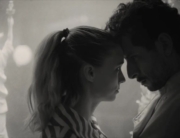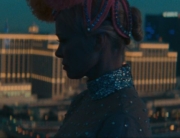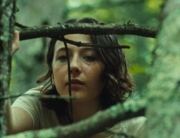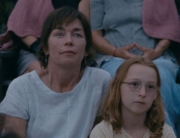It’s safe to say that Paul Schrader is known, in various films, for exploring the heart of darkness, but he usually does so with his focus on redemption, ironic or otherwise. Often, he uses an individual who is in some way outside of society, or set against it. First Reformed, which nods explicitly to Bergman’s Winter Light and Bresson’s Diary of a Country Priest, features a tortured minister, whose debilitating struggle to maintain his faith leads him to a striking, Christlike extreme. His next film, The Card Counter, tells the story of a gambler who is haunted by his past in a military prison, and he meets a terrible twist of fate with the stoic grace of a saint. Most famously, Schrader’s screenplay for Taxi Driver, which might remain his single greatest work, is filled with Christian imagery and also acts as a superb commentary on the kinds of violence society will and will not condone.
Though Master Gardener has no explosion of on-screen violence, it also brings us into the world of a troubled protagonist. It has its eyes on redemption as well. Narvel Roth (Joel Edgerton) works at Gracewood Gardens, an old Southern estate that has been in the same family for generations (and may have been a plantation), as the head horticulturist. We first find him musing in his journal on the nature of different kinds of gardens as he narrates from his journal entries, as he will throughout the movie. He is sleeping with Norma Haverhill (Sigourney Weaver), the owner of the estate. In the one time we see them together, it appears that she is commanding him to do so, and it is unclear when this aspect of their relationship began. It may have something to do with blackmail. Narvel is, in fact, a former White supremacist, hiding in a witness protection program after he betrayed his former associates. The tattoos covering his body testify to his former beliefs.
Norma also asks him to take her grandniece Maya (Quintessa Swindell) under his wing as an apprentice. Maya is biracial (Norma uses the term “of mixed blood”), has dropped out of college, and gotten mixed up in drugs. Norma is taking her in as a favor to her niece, of whom she disapproved. Yet Maya gets on with Narvel and the work very well. An attraction begins between her and mentor, forcing them to come to terms with one another’s dark pasts, and inciting Norma’s jealousy.
Schrader has always been one to swing hard, taking big risks often with both form and subject matter. This one doesn’t land.
From what I glean, his intent is to depict a person grappling with and transcending his haunted past, yet Schrader’s writing fails Narvel almost every step of the way. More so than in many of his previous films, the storytelling is incredibly stilted, with conversations coming across as artificially transactional and dialogue so mannered it comes across as an unintentional parody. (Norma’s comparing Narvel to Humbert Humbert and Maya to Lolita struck me as especially contrived.) At first, this excessive formality seemed a fitting sheen for a world in which dark secrets are suppressed, and at the beginning this was how the style came across. If this was Schrader’s intent, he wasn’t fully in control, for characters speak the same way regardless of the setting or circumstances. Visual differences aside, Gracewood Gardens does not seem so different from the rest of the world, and all tension is abruptly snuffed out of the story in a chapter when Maya and Narvel are temporarily banished from the estate.
Furthermore, the principal characters, Maya especially, are so underdeveloped that their actions, and the relationships between them, fail to carry the significance Schrader requires of them. This is in no small part because they (again, Maya especially) tend to dish facts about themselves rather than to have any kind of personality. The least convincing aspect of the story, by far, is Maya’s attraction to Narvel. Their love scenes often feel like we’re watching wax dolls in action, and there is next to no believable growth of budding passion. The first time she kisses him on the cheek, it comes across as completely unmotivated. This is to say nothing of a series of flashbacks to Narvel’s time with fellow White supremacists, which are so undercooked and riddled with platitudes that they actually come across as kind of goofy.
By the end, the movie is a muddle, with climactic actions appearing almost nonsensical. Still, the world of the garden is created with care, and there are a few performances that stand out regardless of the subpar writing. Sigourney Weaver might be the real highlight, playing the dowager with hauteur and camp, perhaps aware that she is trapped in a film that is hard to take seriously.







Leave A Comment